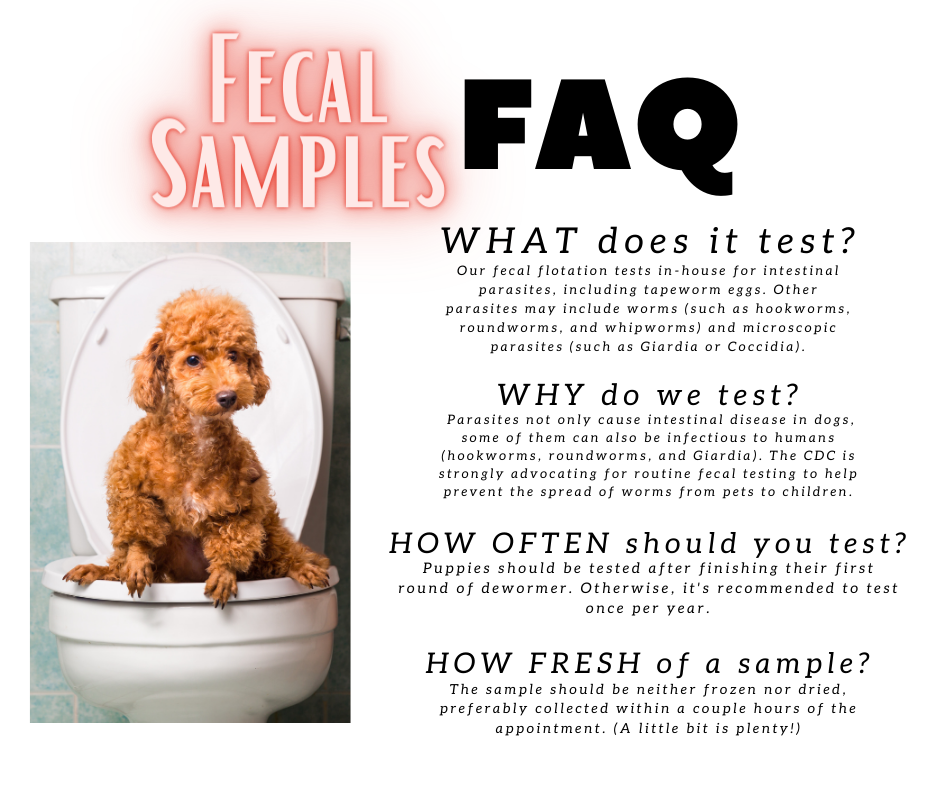As pet owners, we all share a common goal: to provide the best care and quality of life for our beloved furry companions. From regular veterinary visits to a balanced diet and ample exercise, we invest time and effort into ensuring our pets thrive. However, amidst all the cuddles and playtime, there’s a critical aspect of pet healthcare that often goes unnoticed: fecal testing. Yes, you read that right! Fecal testing plays a pivotal role in safeguarding the health of our pets, and in this blog post, we’re going to dive deep into its importance.

Fecal testing might not be the most glamorous aspect of pet care, but it is undoubtedly one of the most important. By regularly submitting stool samples for analysis, you’re taking proactive steps to maintain your pet’s health and well-being. Whether you have a puppy or a senior pet, indoor or outdoor companions, regular fecal testing is an integral part of responsible pet ownership. So, let’s give a round of applause to this behind-the-scenes hero of pet healthcare – the humble fecal test! Your pet’s health will thank you for it.
The Microscopic World of Fecal Matter
Fecal testing, also known as fecal analysis or fecal examination, involves the microscopic examination of your pet’s stool to identify potential parasites, bacteria, and other pathogens. This non-invasive procedure helps veterinarians detect a range of issues that might otherwise go undetected, even in apparently healthy pets.
1. Identifying Parasitic Infections:
Parasites are a common concern in pets, especially in those who spend time outdoors or interact with other animals. Worms such as roundworms, hookworms, tapeworms, and whipworms can cause a host of health problems, including weight loss, lethargy, diarrhea, and even more serious complications. Fecal testing allows veterinarians to spot the presence of these parasites and take prompt action.
Our in-house fecal flotation test also gives us the ability to test for tapeworm eggs in house! Tapeworm eggs are typically transmitted through fleas and can be found on a pet’s fur as well.
2. Preventing Zoonotic Diseases
Zoonotic diseases are illnesses that can be transmitted from animals to humans. Fecal testing in pets is a key strategy to identify the presence of zoonotic pathogens, such as Giardia or Cryptosporidium, which can pose a risk to both pets and their human families.
The CDC has made a strong push for veterinarians to provide more routine fecal testing to help prevent the spread of these parasites and diseases. (For more: https://wonder.cdc.gov/wonder/prevguid/p0000424/p0000424.asp)
How Often Should You Conduct a Fecal Test for Your Pet?
While there isn’t a one-size-fits-all answer, several factors influence the frequency of fecal testing for your furry friend.
Post-Treatment Testing
If your pet has been treated for a parasitic infection, it’s recommended to conduct a follow-up fecal test to confirm that the treatment was effective and that no residual parasites remain.
This is especially important for puppies after finishing their initial deworming. A fecal test helps ensure that the deworming was effective. If not, adjustments can be made to the treatment plan.
Age and Lifestyle
The age and lifestyle of your pet play a crucial role in determining the testing frequency. Puppies and kittens are more susceptible to parasitic infections due to their immature immune systems, making them candidates for more frequent testing. Similarly, if your pet spends a lot of time outdoors, interacts with other animals, or frequently visits places like dog parks, regular testing is recommended.
High-Risk Areas
If you live in an area where certain parasites are more prevalent, such as tick-infested regions or places with a high population of stray animals, more frequent fecal testing might be necessary.
Routine Preventive Care
For most pets, conducting a fecal test at least once a year is a good rule of thumb. This helps in identifying any potential issues early on, even if your pet appears healthy. Regular testing allows you to catch problems before they escalate, ensuring your pet’s comfort and well-being.
Change in Behavior or Health
If you notice any changes in your pet’s behavior, appetite, or bathroom habits, it’s a signal to consult your veterinarian. In such cases, they might recommend conducting a fecal test to rule out any underlying issues.
Breeding or Boarding
If you’re planning to breed your pet or board them in a kennel, many facilities require recent fecal testing results to ensure the health of all animals involved.
The frequency of fecal testing varies based on your pet’s age, lifestyle, and specific circumstances. Regular communication with your veterinarian is key to determining the optimal testing schedule. Remember, an ounce of prevention is worth a pound of cure, and fecal testing is a proactive step toward keeping your pet healthy, happy, and parasite-free.


